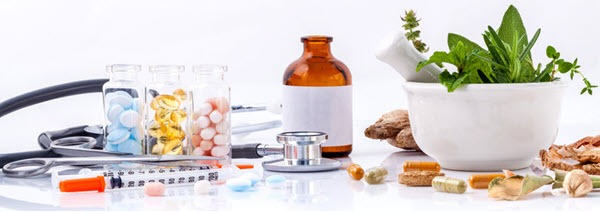 Evidence-based pharmacological practice typically limits prescribing to agents that are either FDA-approved, or if used in an “off-label” way, are at a minimum, supported by highly reputable clinical trials. Natural supplements however, don’t enjoy the benefits of patent protection and thus have no motivation to conduct expensive randomized control trials. As a result, studies on supplements will typically vary in quality – and especially in sample size. Small sample sizes and studies of short duration are very difficult to interpret when it comes to safety and efficacy, so prescribers and patients alike have to rely on their own judgment and interpretation of available evidence when evaluating whether to try certain natural products. Below are 5 alternative medications often utilized in psychiatry, together with my comments.
Evidence-based pharmacological practice typically limits prescribing to agents that are either FDA-approved, or if used in an “off-label” way, are at a minimum, supported by highly reputable clinical trials. Natural supplements however, don’t enjoy the benefits of patent protection and thus have no motivation to conduct expensive randomized control trials. As a result, studies on supplements will typically vary in quality – and especially in sample size. Small sample sizes and studies of short duration are very difficult to interpret when it comes to safety and efficacy, so prescribers and patients alike have to rely on their own judgment and interpretation of available evidence when evaluating whether to try certain natural products. Below are 5 alternative medications often utilized in psychiatry, together with my comments.
SAM-e (S-adenosylmethionine)
Clear evidence exists for Sam-e’s efficacy for depression. I believe it stands up well to any of the agents in the SSRI group (Prozac, Lexapro, etc.). I like SAM-e as a stand-alone or as an adjunct to other antidepressants in treatment-resistant instances, but it’s to be avoided in high-anxiety, high-distress factor depressions, because it is very stimulating. My very first consideration when evaluating a depressed patient is to best determine whether mood cycling is involved. So if the depression is bipolar in nature, Sam-e can definitely trigger the emergence of agitation, anxiety, irritability and insomnia. Regardless of the circumstances, Sam-e should be started low – at no more than 200mg in the morning, to be on the safe side. Excellent brands include Nature Made and Jarrow Formulas. (Anything carrying the Jarrow brand is first-rate).
Melatonin
Melatonin is a naturally occurring hormone, with levels gradually increasing during the darkening hours and throughout the night, resulting in sleepiness. Immediate-release and extended release preparations are available to cover the key aspects of the sleep cycle – getting to sleep and staying asleep. It’s worth considering taking one of each for those who can’t settle down at bedtime and are subject to awakenings. Effective dosage ranges are as low as 0.3mg up to 5mg. Lower the dose if next-day sedation occurs. Important: Because it’s a hormone, melatonin doesn’t work like the more traditional sleeping pill Ambien or the benzodiazepine Xanax in adults, as it may take 2 weeks or so to exert its effects. And in the “maybe-you-didn’t-know-this” category, melatonin is notably beneficial for symptoms of GERD (gastroesophageal reflux disease).
St. John’s Wort
First and foremost, I NO LONGER recommend SJW. At best, it functions as a mild SSRI with no sexual side effects. The absence of sexual side effects is certainly a plus but is outweighed by the potentially high incidence of drug-drug interactions linked to SJW. Specifically, it increases the actions of several liver enzymes, decreasing serum levels of numerous other medications. Also, there’s a possibility of developing a phototoxic rash when exposed to sunlight. Risks far exceed benefits, if you ask me.
GABA
GABA is naturally produced in the body, and is the body’s major inhibitory neurotransmitter. This means it puts the brakes on the brain and the body moving both into low gear. But there’s uncertainty as to whether supplemental GABA as an OTC product, is able to enter the brain from the bloodstream. I believe it works for some people, but again as is the case with so many supplements, it is replete with drug interactions.
Omega-3 Fatty Acids (Fish Oil)
Fish oil is a combination of two fatty acids – EPA and DHA. EPA has antidepressant effects, while DHA has some positive benefits on improving cognition. However, the doses used in clinical trials to demonstrate EPA’s and DHA’s efficacy, means consuming numerous gelcaps (8 per day). The gelcaps can be rather large and are accompanied by a fishy smell, but here’s a little trick: Freeze the capsules before taking them and the odor will be eliminated. Full disclosure: I take a fish oil supplement twice daily. My clinical self tells me that the effect size of how much I’m taking is so negligible, I shouldn’t waste my money on it, but a strong believer in the placebo effect that I am, I’m not about to stop. The best source for maximizing the benefits of fish oil? Eat salmon at least 3 times per week.
Whether for yourself or a client, supplements are best used for milder manifestations of the disorders for which they are purportedly effective. They’re also good choices for those opposing prescription drugs, or are already on conventional medications and wish to use supplements as an augmentation strategy.
Attribution Statement:
Joe Wegmann is a licensed pharmacist & clinical social worker has presented psychopharmacology seminars to over 10,000 healthcare professionals in 46 states, and maintains an active psychotherapy practice specializing in the treatment of depression and anxiety. He is the author of Psychopharmacology: Straight Talk on Mental Health Medications, published by PESI, Inc.
To learn more about Joe’s programs, visit the Programs section of this website or contribute a question for Joe to answer in a future article: joe@thepharmatherapist.com.